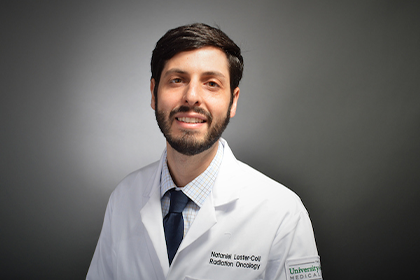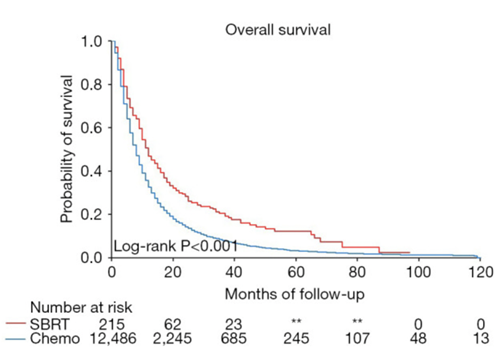
Dr. Lester-Coll
Lung cancer is the leading cause of cancer deaths and 85% of all lung cancer cases are non-small cell lung cancer (NSCLC). One type of NSCLC is oligometastatic disease where metastases are present but are limited in number. This form of NSCLC has previously been treated using systemic therapy, such as chemotherapy. However, new evidence indicates that oligometastatic patients may see greater benefit from local therapy. One example of local therapy, that first came into use in 2004, is Stereotactic Body Radiation Therapy (SBRT) which allows for precise local delivery of radiation.
A new study in the Journal of Thoracic Disease from University of Vermont Cancer Center members Nataniel Lester-Coll, MD, Brian Sprague, PhD, and Pamela Vacek, PhD in collaboration with colleague Joan Skelly at the University of Vermont Biomedical Statistics Research Core, utilized data from the Surveillance, Epidemiology, and End Results (SEER) – Medicare database to investigate the effect of SBRT use on patient outcomes, hospitalizations, and cost compared to the standard chemotherapy regimen. Their work indicates that patients treated with first-line focused radiation therapy (SBRT) had increased survival, lower hospitalization rates, and similar costs per month of survival when compared with patients who were treated with first-line chemotherapy.

This work aims to bring awareness to alternative treatment approaches for patients who present with metastatic disease, specifically highlighting the effectiveness of highly focused radiation therapy. “It is part of a paradigm shift in viewing metastatic cases not through the lens of a uniformly dismal prognosis, where the priority for treatment is disease stabilization and symptom management, but rather as heterogeneous cases where a favorable subset could be selected for aggressive management with curative potential,” says lead investigator Lester-Coll.
Future work by the group aims to determine how a combination therapy of focused radiation and immunotherapy may further improve patient outcomes. This work was funded by an LCCRO grant. To follow along on their journey, find Dr. Lester-Coll on Twitter
@DrLesterColl.